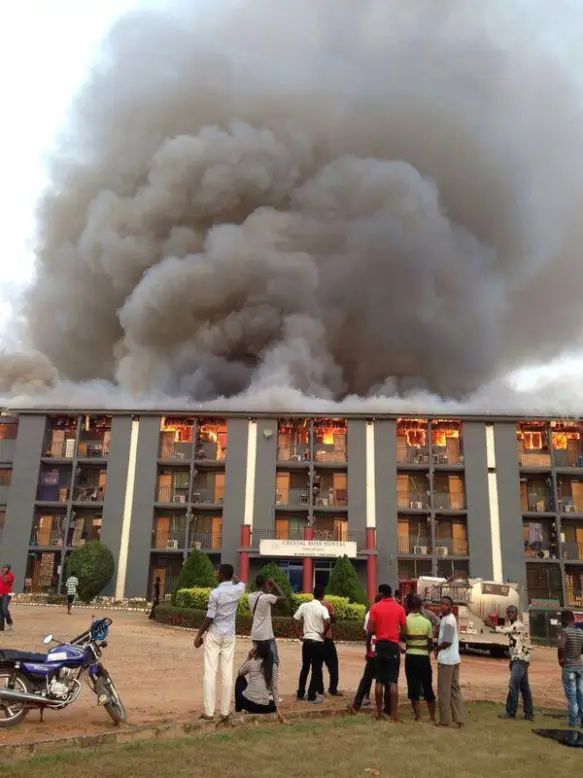A fierce blaze engulfed a three-storey student accommodation facility known as “Father Hostel” at the Kwame Nkrumah University of Science and Technology (KNUST), Ghana on Thursday night. The fire, which rapidly spread through the building, has left students devastated and raised serious questions about fire safety measures on campus.

The inferno, whose cause remains undetermined, inflicted severe damage on the hostel structure. At least nine rooms were completely destroyed, reducing students’ living spaces and personal belongings to ashes. The incident has not only left the direct victims in distress but also instilled fear among students residing in adjacent buildings.
Eyewitness accounts paint a harrowing picture of the fire’s rapid progression. Students reported that the blaze originated in a single room before swiftly engulfing the entire building. The speed at which the fire spread left little time for occupants to salvage their possessions, with many losing everything they owned within minutes.
While the absence of casualties comes as a relief, the fire’s aftermath presents significant challenges. At least nine students now find themselves without accommodation or personal belongings, facing an uncertain immediate future. The remaining portions of the building have been deemed uninhabitable due to extensive structural damage, further exacerbating the accommodation crisis for affected students.

The incident has also brought to light concerns about emergency response capabilities on campus. Eyewitnesses reported a disturbing 30-minute delay in the arrival of firefighters, attributed to initial difficulties in reaching the KNUST Fire Department’s emergency number. This delay in response time potentially contributed to the fire’s extensive spread and the resulting damage.
In response to this crisis, the KNUST Students’ Representative Council (SRC) has taken swift action to support the affected students. Temporary accommodation has been arranged at the SRC hostel, providing immediate shelter for those displaced by the fire. This quick response highlights the student body’s solidarity in times of crisis.
The SRC has also seized this opportunity to emphasize the importance of fire safety awareness among the student population. In light of the incident, the council is urging all students to strictly adhere to safety protocols to prevent similar occurrences in the future. This call to action underscores the need for increased vigilance and improved safety measures across all student accommodations.
As investigations into the cause of the fire continue, questions are being raised about the overall fire safety infrastructure at KNUST and other institutions of learning in Ghana. The incident has sparked discussions about the need for regular fire drills, improved emergency communication systems, and potentially upgrading fire prevention measures in older buildings on campus.
The university administration faces the immediate challenge of providing long-term solutions for the displaced students. Beyond temporary accommodation, there’s a pressing need to address the loss of academic materials and personal belongings, which could significantly impact the affected students’ academic progress.
This devastating fire at KNUST serves as a stark reminder of the importance of fire safety in educational institutions. As the university community comes to terms with the incident, it’s clear that lessons must be learned to prevent future occurrences. Improved emergency response systems, enhanced fire safety measures, and ongoing education about fire prevention could all play crucial roles in safeguarding student welfare on campus.



